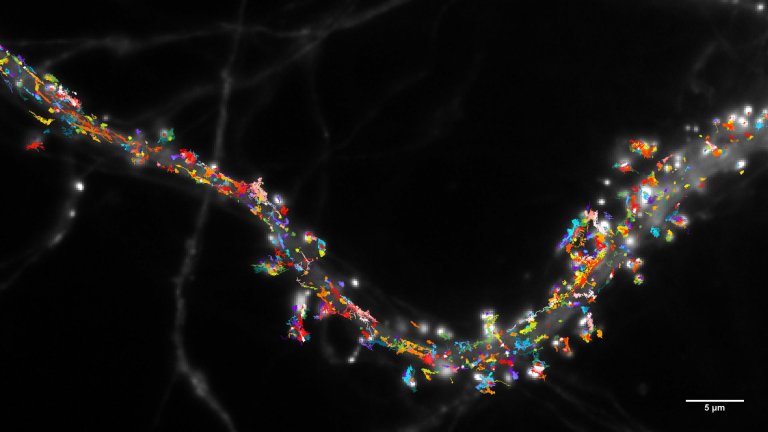
© Benjamin Compans / Daniel Choquet / IINS / CNRS Photothèque
View the mediaScientific news
CNRS is organising conferences, workshops and film-discussions about the brain throughout France during the Brain Awareness Week from 11 to 17 March 2024. This is a great opportunity to present you with an overview of research on this intriguing object!

© Benjamin Compans / Daniel Choquet / IINS / CNRS Photothèque
View the mediaIt is the most complex machine in the world, capable of feats that the most powerful computers are unable to replicate. It is the seat of our personality, our emotions, our ability to appreciate the world around us, the driving force of each of our gestures, in short, the most indispensable organ in the human body. However – and perhaps precisely because it is so complex – the brain is far from having revealed all its secrets. In fact, we will probably never know them all, as if our brain itself were intangible. This is obviously a reason to continue to explore it.
Researchers from very different backgrounds are working tirelessly to crack the mysteries of the human brain one by one, sometimes through the prism of neuroscience, sometimes through that of linguistics, psychology, or social sciences. It raises numerous questions: how do we think? How do we sort (more crucial than ever in the era of increased fake news and attention economics) between “good” and “bad” information? More generally, how do we learn information systems as complex as a language or the common rules of life from an early age? Neurologists and psycholinguists are trying to discover this by conducting series of increasingly more innovative experiments.
Other aspects of the human brain are even more difficult to understand, as they are intangible and unquantifiable… If we were only learning machines, we would be like robots at different stages of development, indistinguishable from each other except for our computing power and the amount of information we have ingested. Yet, we all have distinct personalities, linked in a large part to our creativity and originality. How can we assess them? What are the origins and conditions for their development? This is the subject of fascinating research conducted by scientists.
There is still the question of emotions which are also managed by the brain. How can we measure and understand them? Traumatic events, such as terrorist attacks, are an opportune time to do this, but the barely describable still needs to be able to be translated into analysable data… This is the purpose of the 13-11 research programme, which studies how the memory of the 13 November 2015 attacks is constructed from interviews and notebooks. And trauma means treatment and reconstruction. This is the last major area of research on the human brain: regenerative medicine which aims to help victims of physical or psychological accidents overcome the shock and recover all their capacities. This is an often long and painful road, in which fundamental research is exceedingly useful.
As you will have understood, our brain is an incredibly fascinating area of research, and in this presentation, we invite you to explore its multiple aspects together with the scientists who study it on a daily basis.
Our work is guided by the way scientists question the world around them and we translate their research into images to help people to understand the world better and to awaken their curiosity and wonderment.